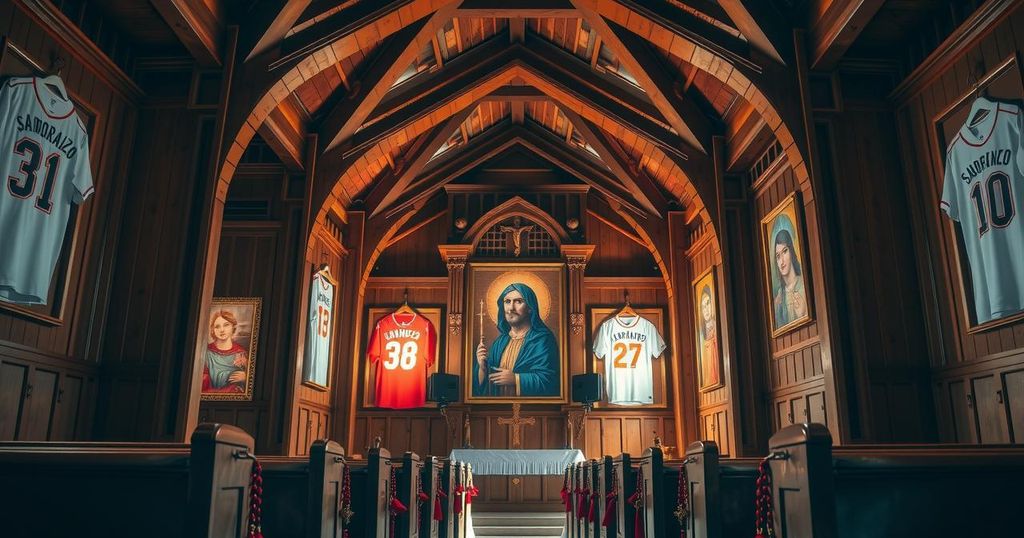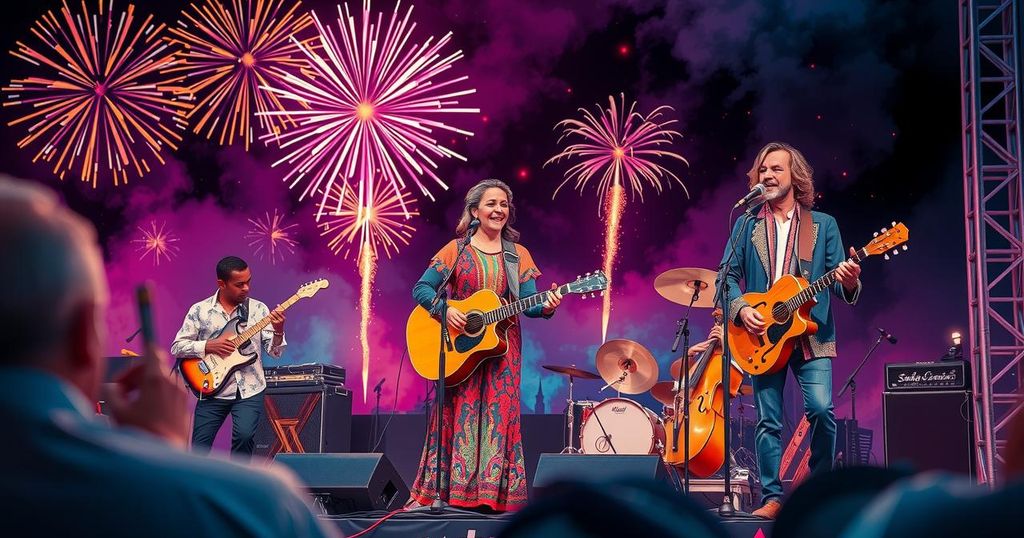Celebrity
ALMAGRO, ARGENTINA, ASIA, BUENOS AIRES, CATHOLIC CHURCH, CONTROVERSY, ENTERTAINMENT, EUROPE, EVENTS, FLORES, FRANCIS, FRANCISCO, GUATEMALA, HISTORY, ITALY, JORGE MARIO BERGOGLIO, LORENZO, MASSA, NORTH AMERICA, OBITUARY, PARAGUAY, PHILIPPINES, POPE, ROME, SAN, SAN LORENZO, SOUTH AMERICA
David O'Sullivan
0 Comments
Pope Francis’ Legacy and San Lorenzo: Tributes Amid Controversy
After the death of Pope Francis, San Lorenzo held a memorial Mass attended by devoted fans. His club membership number sparked superstitious beliefs reflecting his legacy. However, the club is also mired in controversy involving its president amid grieving tributes from supporters.
BUENOS AIRES, Argentina — Following the passing of Pope Francis, his beloved soccer club, San Lorenzo, hosted a memorial Mass late Wednesday. This gathering came just two days after his death, with the city engulfed in emotional tributes to the first Latin American pope. Members of the club clad in jerseys and clutching rosaries filled the chapel in the Almagro district, a place rich with the history of both the soccer team and the pontiff, who once celebrated Mass there.
Many San Lorenzo supporters were focused on an intriguing coincidence, speculating extensively online. The pope’s club membership number, 88,235, is seen by some fans as significant because it reflects both his age at death—88 years—and the exact time of his passing at 2:35 a.m. in Buenos Aires, or 7:35 a.m. in Rome. Lifelong fan Jorge Mario Bergoglio, who became Pope Francis, had attended matches with his father and stayed loyal to the club throughout his life, even paying membership dues until his recent death.
Father Juan Pablo Sclippa, who led the Mass, expressed sentiments shared by many in attendance. “We’re not saying goodbye to just a fan; we’re saying farewell to a friend,” he stated from an alter adorned with images of the pope. He characterized Francis as the “best player” in the world, exuding a humility that resonated deeply within the community.
The club itself became central to the narrative of Bergoglio’s image, often referred to as the “Pope of the people.” Founded by Father Lorenzo Massa in 1908, its mission was to steer children away from the dangers of street life. Numerous fans at the gathering reflected this connection, with Pablo Avalos, 52, emphasizing how the pope’s influence sparked his own passion for San Lorenzo and the club’s roots in social action.
Francis was known for his humility and informal demeanor, as evidenced by his choices as both a local cleric and a global leader. He was approachable, favoring bus commutes and engaging in soccer banter. At the Vatican, he remained down-to-earth, opting for simplicity over opulence. Despite a packed schedule, he remained connected to San Lorenzo, keeping track of the team through radio broadcasts, a choice he made back in 1990 when he decided to stop watching television.
There are those who view the club’s successes as miraculous, assigning them to Francis’ influence since his papacy began in 2013. San Lorenzo’s ascent included a championship win months after he took the throne, and a Copa Libertadores victory in 2014. The team even made celebratory visits to St. Peter’s Basilica to show gratitude for the pope’s unwavering support.
“He’s our father,” said long-time fan Gaciela Iglesias, 69, reflecting the sentiment of many. However, Francis’ death did not come without complications for San Lorenzo, as the club faces internal turmoil. On the same day, reports emerged of president Marcelo Moretti embroiled in a scandal involving allegations of fraud, with a video leak showing him accepting cash inappropriately from a player’s mother. An investigation is now underway, and tensions are high among supporters, some visibly protesting at the club headquarters nearby while others offered prayers for the pope.
In conclusion, the legacy of Pope Francis, a devoted fan of San Lorenzo, continues to reverberate across Buenos Aires following his death. Memorial services have drawn fans together, uniting them in grief and nostalgia. Speculations about numerology surrounding his membership number reflect the deep ties between Francis and the club. While his passing brings emotional tributes, San Lorenzo is also facing challenges that cast a shadow on its current fortunes.
Original Source: www.oregonlive.com




Post Comment